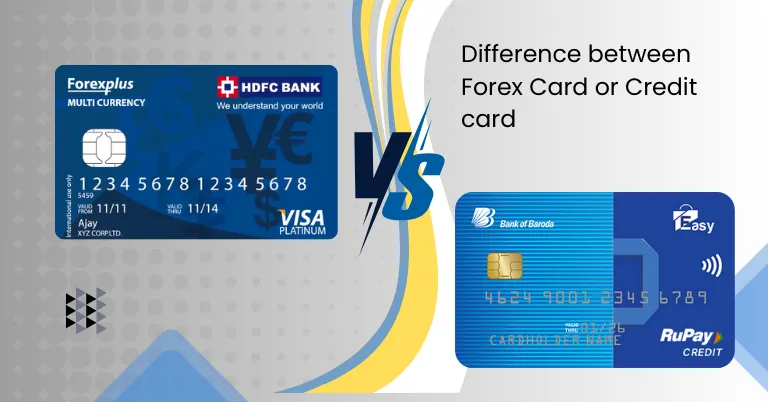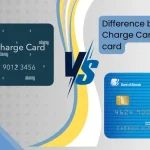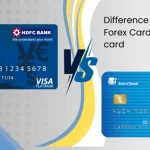In any journey abroad, one should always seek to manage money very carefully. There are two majorly used financial instruments among travelers: Forex cards and credit cards. Despite the convenience factor, they have different purposes, provide various benefits, and some limitations as well. Thus, it is important to know their differences.
Here we are going to discuss Forex Card vs Credit Card in brief
What is a Forex Card?
A Forex card is also known as a travel card or prepaid travel card and is especially used for international travelers. Preloaded with foreign currency, this financial product can be used almost like a debit card on your journey, easy and safe. An excellent tool is a Forex card.
Key Features of Forex Cards
- Preloaded with Foreign Currency: The Forex card allows you to preload the currency of the destination country you are heading to. For instance, if you are going to Japan, you can preload your Forex card with the Japanese yen.
- Fixed Exchange Rate: When you load your card, the rate at that time is frozen. It saves you from fluctuation in the currency rates and provides predictability of cost.
- Forex cards have numerous application uses, such as point-of-sale transactions, withdrawal at an ATM, and sometimes even for online transactions.
- Reloadable: Upon depletion of the money held by the card, you can reload it with more currency through your bank or any other provider.
- Safety: It is safer to carry the Forex card as it comes with PIN protection and a facility to block the card if lost or stolen compared to carrying large amounts of cash.
Advantages of Forex Cards
- Economical: Forex cards have lesser transaction fees and better exchange rates compared to credit cards.
- Budget Control: Since you load a particular amount, a Forex card helps you stick to a predetermined travel budget.
- Multiple Currency Support: You can load several currencies into Forex cards. So, you can carry one Forex card on a multi-destination trip.
- Improved Safety: Forex cards are far better in terms of security as compared to cash or even a credit card at some instances.
Limitations of Forex Cards
- Limited Savings: One cannot make an expenditure beyond the savings that are pre-loaded on a Forex card. Once the Forex card is spent out, then there is nothing to do but to reload, which can be an issue during an emergency.
- Usage Restriction: Forex cards cannot be used in some merchant or online portals.
- Fixed Exchange Rate: Though it has the benefit of fixing the rates, at the same time, you will lose out on the possibility of having better exchange rates that could come up later once the card is loaded.
What is a Credit Card?
A credit card is a loan product through which you are authorized to spend up to a pre-defined credit limit. It has more flexibility in repayment than the Forex card and also easy access to emergency funds. There is a lots of banks who provides credit cards. For example HDFC Bank credit card, Bank of Baroda bank credit card, etc.
Key Features of Credit Cards
- Borrowing limit: Every credit card contains a credit limit based on the credit profile and credit-worthiness.
- Differential payments: You have rights over the repayment of the amount in full at the last date of the billing cycle, or at least the minimum and carry out the balance that attracts an interest rate.
- Interest and Charges: Credit cards have the highest interest rates on such balances carried as well as fees for overseas transactions, cash advances.
- Universal Acceptance: Credit cards are widely accepted worldwide and thus one of the must have gear for traveling across the border.
- Impact on Credit Score: The timely usage of credit cards contributes to increasing the credit score; skipping the installments reduces it.
Advantages of Credit Cards
- Accessibility of Liquid Funds: The credit card owns the financial backup, especially when all funds need a trip.
- Rewards and Incentives: Credit cards are widely acclaimed to provide a range of incentives like cash back, travel insurance, and points, which can be traded for flights, hotels, and other travel costs.
- International Acceptability: Credit cards are accepted by almost everyone-mart shops, hotels, or even the internet services operating globally.
- Building Credit: Responsible use of a credit card contributes to the building of a healthy credit history.
Limitations of Credit Cards
- High Fees: You may incur foreign transaction fees, interest on carried balances, and cash advance fees.
- Debt Risk: Spending more and carrying unpaid balances may be the primary reasons you are in financial stress.
- Poor Conversion Rates: You will generally get poor currency conversion rates for credit card transactions than Forex cards.
Which Should You Choose? – Forex Card vs Credit Card
The decision between a Forex card and a credit card is purely according to your travel requirements and financial behavior:
- A short period of travel with a predefined budget: Forex cards can be used for cheap remittances and cost control.
- Long term of stay or unknown expenses: credit card is preferred because it is widely accepted and there is flexibility in using it
- Both: Carry Forex card for daily usage and credit card for emergency or high-value items.
Conclusion
Both are useful tools for international travel but for different needs of money. The reason that Forex cards are free with an excellent advantage to a tight-budgeted traveler, while credit cards can be free to use, which in addition gives comprehensive rewards, understanding their characteristics and drawbacks will enable you to make an informed decision of what financial tool most probably would help you during travel, and how effectively to do that.
FAQs on Forex Card vs Credit Card
Q1 : Can I use a Forex card for online purchases?
Ans: Yes, Forex cards are accepted for online transactions. If the online merchant accepts this card, and if its loaded currency is in confluence with that currency, then online transactions can be done.
Q2 : Are Forex cards safer than credit cards?
Ans: While traveling, forex cards are more secure to carry as it is preloaded with an amount and PIN protection is there. Credit cards are more feature-rich in terms of fraud protection.
Q3 : Do credit cards provide better rewards?
Ans: More rewarding in terms of rewards, credit cards are when compared to forex cards. This includes cashback, points, and travel insurance.
Q4 : Which is better for a multi-destination trip?
Ans: Forex card would support multiple currencies to facilitate all daily expenses and use of a credit card ensures backup support for all emergencies and unplanned expenses.






